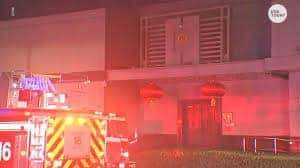FBI believes Chinese researcher with links to Beijing's military in hiding in consulate in San Francisco

The FBI believes that a Chinese scientist with links to Beijing's military is hiding out in China's consulate in San Francisco in order to evade arrest after she was accused of visa fraud, according to filings in the U.S. District Court in San Francisco.
The revelation comes after Washington said it ordered Beijing to close its consulate in Houston, Texas, by Friday amid espionage accusations – a move China vowed to retaliate against as relations between the two superpowers plumb new lows over coronavirus, trade and Beijing's move to claim more authority over Hong Kong.
According to the court filings, Tang Juan, a biology researcher at the University of California, Davis, was questioned by the FBI on June 20 and charged with visa fraud six days later. Investigators allege she falsely claimed on her visa application that she had not served in the Chinese military. However, photos of her in a Chinese military uniform were discovered and it was later ascertained that she had worked as a researcher at China’s Air Force Military Medical University (FMMU), according to the filings.
After being questioned by the FBI, Tang fled to China's San Francisco consulate, "where the FBI assesses she has remained," U.S. prosecutors allege.
The court filings were published on July 20.
During her interview, Tang denied serving in the Chinese military and claimed that wearing a military uniform was required for attendance at FMMU. Neither the Chinese consulate in San Francisco nor Tang could be immediately reached for further comment. The U.S. State Department did not reply to a request for comment.
The court filings also mention two other recently charged Chinese researchers suspected of providing false information about their identities to authorities for the purpose of remaining in the U.S. These researchers worked at the University of California, San Francisco, and Duke University, respectively. The court filings do not explicitly accuse any of the Chinese researchers of specific spying-related crimes.
However, the filings said their cases were not isolated and appear "to be part of a program conducted by (China's military) – and specifically, FMMU or associated institutions – to send military scientists to the United States on false pretenses with false covers or false statements about their true employment. There exists evidence in at least one of these cases of a military scientist copying or stealing information from American institutions at the direction of military superiors in China."
China's foreign ministry has repeatedly dismissed allegations from the Trump administration that China is trying to steal American secrets or be obstructive over the coronavirus pandemic, trade or other disputatious issues as malicious slander and part of Trump's election strategy to distract voters from his own governance mistakes.
Republican Senator Marco Rubio and Trump administration officials characterized China's Houston consulate as a hub for espionage. However, it remains unclear what triggered the decision to order the facility closed within 72 hours, given that Washington has long accused Beijing, with good reason, of cultivating a network of spies at its overseas diplomatic compounds and elsewhere.
In a speech Wednesday during an overseas trip to Denmark, U.S. Secretary of State Mike Pompeo appeared to indicate that the move was part of a general approach to be less tolerant toward China over its misdeeds. "President Trump has said 'enough.' We’re not going to allow this to continue to happen." Pompeo said. "We are setting out clear expectations for how the Chinese Communist party is going to behave."
On Tuesday, the Department of Justice indicted two Chinese hackers charged with stealing trade secrets from hundreds of global targets and probing for vulnerabilities in U.S. companies involved in the development of COVID-19 treatments and vaccines.
But Daniel Russell, who served in several senior roles as an Asian affairs adviser in the Obama administration, said that Pompeo has embarked on a "series of increasingly vitriolic anti-China tirades" and the "China accusation that this move has more to do with presidential politics than with intellectual property is hard to argue with."
Link and Picture: https://www.usatoday.com/story/news/world/2020/07/23/chinese-scientist-hiding-consulate-san-francisco/5492095002/




